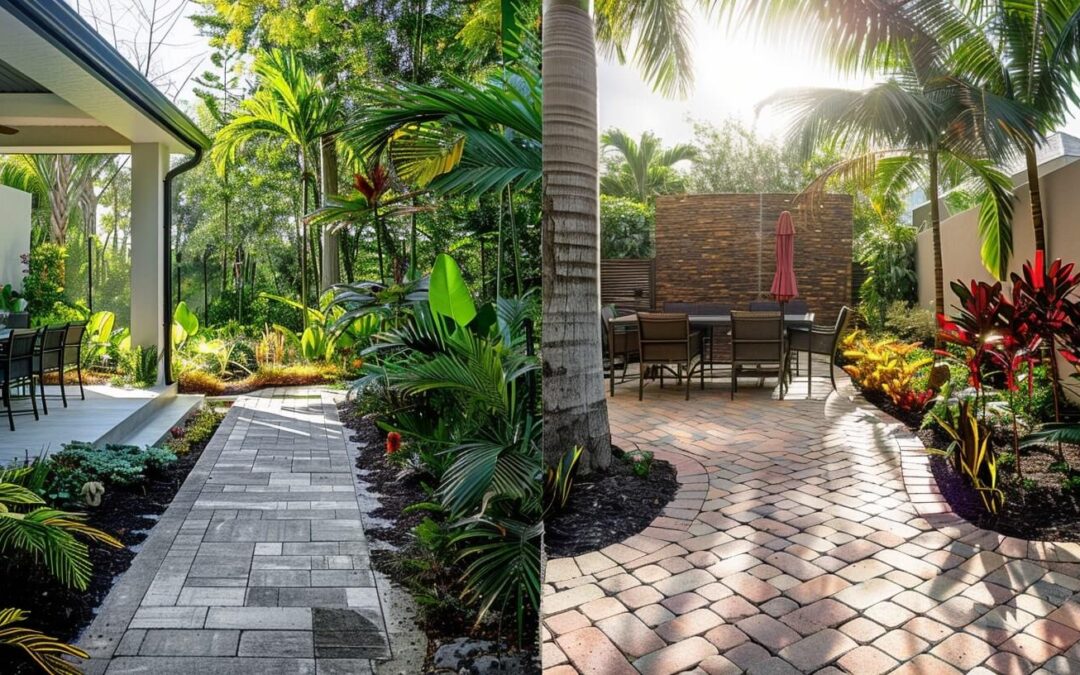When it comes to choosing between concrete and pavers for your Miami home, you’re faced with a decision that impacts both aesthetics and functionality. Concrete’s affordability and low maintenance make it a popular choice for driveways, but it can be prone to cracking in Miami’s intense climate. On the other hand, pavers offer a range of design options and superior drainage, though they come with higher upfront costs and more upkeep. So, which option truly meets your needs and can withstand the local weather? Let’s explore the crucial factors that will help you make the right choice.
Overview of Concrete
When considering options for your outdoor surfaces, concrete stands out as a popular choice.
It’s durable, versatile, and can handle various weather conditions, making it ideal for Miami’s climate. You’ll find that concrete can be molded into various shapes and finishes, allowing you to match your home’s design aesthetic perfectly.
It’s also relatively low-maintenance, requiring only occasional sealing to keep it looking its best. Plus, concrete can be easily customized with colors and textures to enhance your outdoor space.
Whether you’re looking for a sleek modern look or a more rustic appearance, concrete can meet your needs.
Advantages of Pavers
Pavers offer a unique blend of beauty and practicality that can elevate your outdoor spaces. They come in various shapes, colors, and materials, allowing you to customize your design to match your home’s aesthetic.
This versatility means you can create stunning pathways, patios, or driveways that reflect your personal style.
Additionally, pavers provide excellent drainage solutions, as they allow water to seep through the gaps, reducing runoff and promoting a healthier environment.
Maintenance is simple too; if a paver gets damaged, you can easily replace it without disrupting the entire surface. Plus, their slip-resistant surfaces enhance safety for your family and guests.
Durability Comparison
Choosing between concrete and pavers often boils down to durability, as both materials have their strengths and weaknesses.
Concrete is incredibly strong and can handle heavy loads without cracking, making it ideal for driveways and high-traffic areas. However, it can be prone to surface cracking, especially in extreme weather conditions.
Pavers, on the other hand, offer flexibility; if one paver cracks, you can easily replace it without affecting the surrounding ones. They’re also less likely to crack under stress since they can shift and settle.
In humid Miami, pavers may resist mold and algae better than concrete, which can show stains over time.
Ultimately, your choice will depend on your specific needs and the environment.
Maintenance Requirements
Your home’s outdoor surfaces require different maintenance routines depending on whether you opt for concrete or pavers.
Concrete typically needs minimal upkeep. You’ll want to sweep it regularly and occasionally wash it with a pressure washer to remove dirt and grime. Sealing is advisable every few years to prevent stains and cracking.
On the other hand, pavers require more attention. You’ll need to regularly sweep and occasionally power wash them as well.
Additionally, you should inspect the joints for settling and refill with sand as necessary to maintain stability. If any pavers become damaged, you can easily replace them without affecting the surrounding stones.
Ultimately, your choice will influence how much time and effort you’ll spend on maintenance.
Cost Analysis
When weighing the costs of concrete versus pavers, it’s crucial to consider not just the initial installation but also long-term expenses.
Concrete generally has a lower upfront cost, making it attractive if you’re on a tight budget. However, pavers can be more expensive initially but offer greater durability and ease of repair. If a paver breaks, you can simply replace that single piece, while concrete may require a whole slab replacement.
Additionally, consider maintenance costs: concrete often needs sealing and can crack over time, leading to further expenses. In contrast, pavers usually require less maintenance, which can save you money in the long run.
Ultimately, it’s essential to evaluate your budget and how long you plan to stay in your home.
Frequently Asked Questions
How Do Concrete and Pavers Affect Home Resale Value?
Concrete and pavers can significantly impact your home’s resale value.
Pavers often enhance curb appeal and attract buyers, while well-maintained concrete can provide a clean, durable surface.
Choose wisely to maximize your investment.
Can I Install Pavers Over Existing Concrete?
You can install pavers over existing concrete, but you’ll need to ensure the surface is clean and level.
Proper preparation helps prevent shifting and maintains a durable, attractive finish for your outdoor space.
What Styles and Colors Are Available for Pavers?
You’ll find a wide array of paver styles and colors, from rustic cobblestones to sleek modern designs.
Choose vibrant hues or subtle earth tones to perfectly complement your outdoor space and personal taste.
Are There Eco-Friendly Options for Concrete and Pavers?
Yes, you’ve got eco-friendly options!
For concrete, look for recycled materials, and for pavers, choose those made from sustainable resources.
Both options can reduce your environmental impact while enhancing your outdoor space’s beauty.
How Do Weather Conditions Impact Installation Time for Both Options?
Weather conditions significantly impact installation time.
If it’s too rainy or hot, you’ll face delays.
Cold weather can also slow down curing for concrete, while pavers may shift if the ground freezes.
Plan accordingly!
Conclusion
In conclusion, choosing between concrete and pavers for your Miami home comes down to your specific needs and preferences. If you’re looking for a budget-friendly option with low maintenance, concrete might be the way to go. However, if you value design flexibility and superior drainage, pavers could be worth the investment. Consider the local climate and your long-term plans to make the best decision for your outdoor space. Whichever you choose, both options can enhance your home’s appeal.

